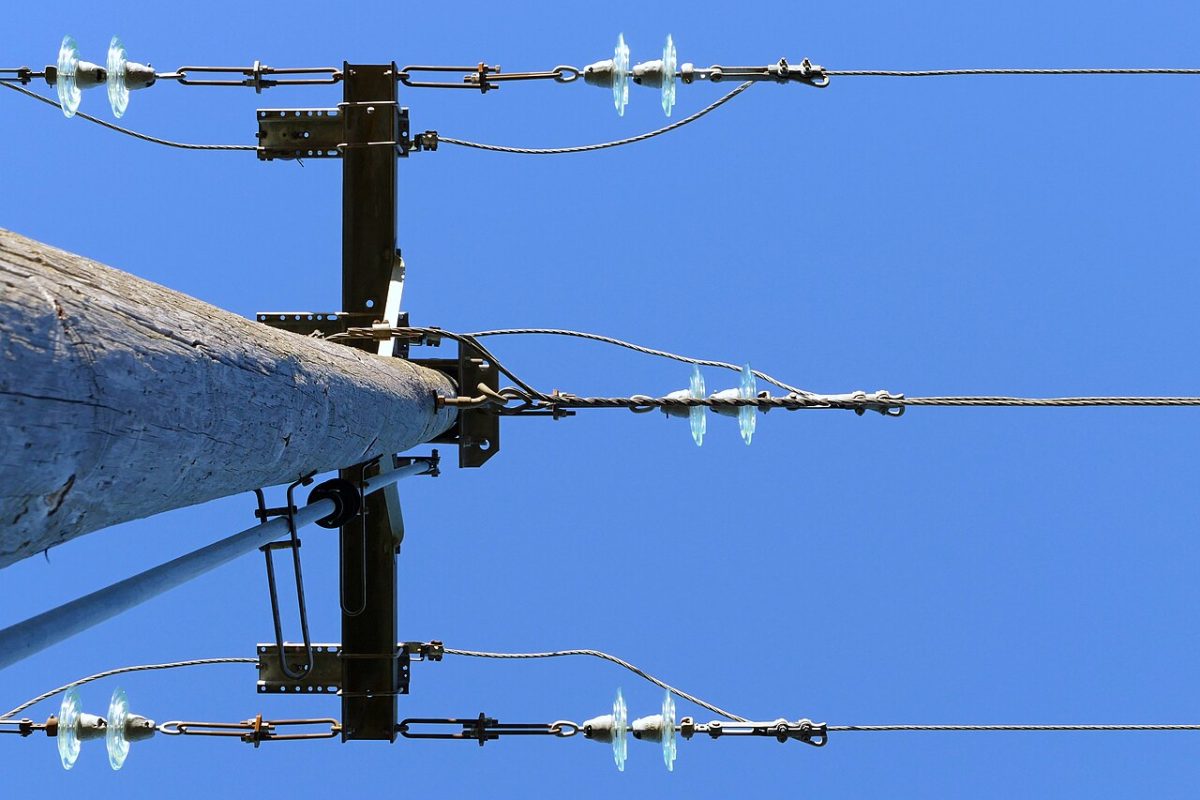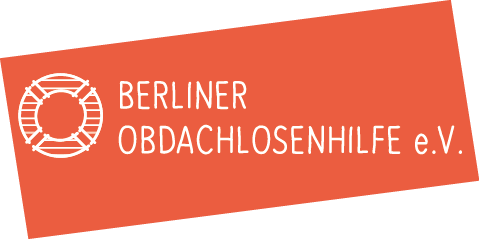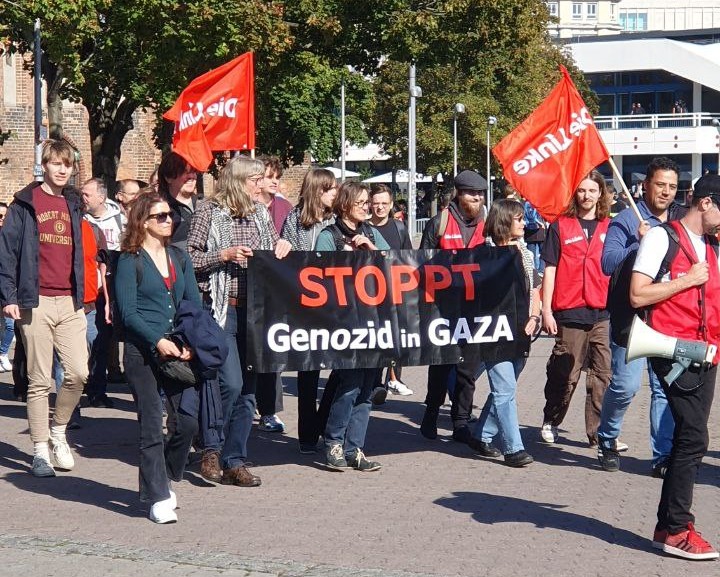2023 was a busy year for theleftberlin. A number of new people joined our editorial team, and we received an unprecedented number of unsolicited articles. We welcome both! It is your contributions which help shape the website and weekly Newsletter (the number of subscribers roughly doubled to around 2,000 people).
The key stories, of course, were around Gaza. As Israel tried to bomb the small piece of land into the Stone Age, we shifted all our editorial capacities to provide coverage that was not being published in the German media (or that in most other countries). Here again, we are grateful for the various people who agreed to be interviewed or asked if we could publish their writings.
We saw this thirst for information in the Palestine Reading Groups which we set up at the end of last year. So far, 30-40 people have been coming every week to discuss different aspects of Israel/Palestine in an atmosphere which is unavailable to them elsewhere in Berlin. As promised when the group started, we will continue meeting as long as people want to come.
There follows a list of the 16 most read articles this year. Although Palestine understandably dominates, the articles cover a range of subjects – it was interesting to see that the three most read articles are about other subjects. Enjoy reading. If you would like to get more involved in 2024, either as a writer, editor, or just with a suggestion about what we should cover, please contact us at team@theleftberlin.com.
Most read article: Dominick Fernow (Prurient) Releases Split Album with Neo-Nazi Band Genocide Organ
Every so often, we receive an unsolicited article by the ‘Antifascist Music Alliance’. These articles are always well-written, thoroughly researched and contain information which is hard to find elsewhere. This year, we published two articles by the AfA, one about German musicians who are showing solidarity with Palestine, and this one.
This article, published in June, highlighted the collaboration between known Nazi musician Dominick Fernow and the KKK-supporting band Genocide Organ. Despite protests within the Berlin music scene, and a ban from Discogs, Fernow and Genocide Organ have received support from Resident Advisor, Pitchfork, and Berghain/Ostgut.
#2 Germany hedges bets in changing international order
In March, Hari Kumar looked at German Chancellor Olaf Scholz’s reaction to the relative decline in the economic power of the USA and the emergence of China as a global Player. Scholz’s response was to try and build his own power bloc, partly through trade deals with most of the BRICS countries (Brazil, Russia, India, China, and South Africa).
Since Russia’s invasion of Ukraine, their role in this bloc building has been more ambiguous. But we are witnessing a challenge to US authority within what was thought to be a USA dominated monopolar world. The article was written before Israel’s assault on Gaza, with Biden’s uncritical support. Some of the precariats highlighted in Hari’s piece are now even more dangerous than when it was written.
#3 Prematurely condemned: The case of Lina E.
Our third most read article was actually published in 2021. Then Lina E was facing trial for fighting back against neo-Nazis in Saxony and Thüringen and pilloried in the press as being “Germany’s most dangerous left-wing extremist.” At the same time, the local police were turning a blind eye to Nazi violence and the press seemed more interested in demonstrations by the climate movement.
After spending 18 months in jail, Lina’s case finally went to court in May 2023, which presumably explains the renewed interest in the article. She was sentenced to over 5 years in jail, provoking a number of demos throughout Germany. Lina has been released and had her passport confiscated, pending appeal. She may have to wait a similar amount of time before her appeal is heard.
#4 “It is inaccurate to compare Israel with South Africa. What’s going on in Israel is much worse”
In March, we interviewed South African Jewish artist Adam Broomberg about living in Italy under a growing Fascist threat and Brexit Britain. Adam finally moved to Berlin, where Stefan Hensel, Hamburg’s “antisemitism Tsar” accused him of supporting anti-Jewish terrorism. Die Zeit newspaper provided Hensel with the platform to make a number of unsubstantiated claims about Adam.
As a result of these claims, Adam lost work both as an artist and a teacher. In the interview, Adam talks about growing up, and fighting against, Apartheid South Africa – which he compares to an Israel which he sees as being “beyond Apartheid”. Two months after we did the interview, Adam was brutally arrested at the Nakba Day protests.
#5 German – Anti-German – Syn-German?
The fifth most read article last year was first published in 2020, but is still regularly read, especially in the last 2 months. Berlin-based Israeli anti-Zionist, Yossi Bartal looks at the phenomenon of the “Antideutsche” – German ex-Maoists, punks and inhabitants of the Left and Antifa Scenes who unconditionally support Israel.
Yossi locates this phenomenon in the growth of nationalism in post-1989 Germany. The Antideutsche felt compelled to defend Israel against the “antisemitic Muslim world”, and, ultimately, to support Western imperialism in the Gulf wars. In the face of the German Left’s inability to adequately respond to Israel’s genocidal attacks of Gaza, Yossi’s article provides useful background.
#6 Why the Two State Solution for Palestine is Impossible
Our sixth most read article is another older article (this time from 2022), which has proved useful in the current discussion around Palestine. Phil Butland looks at the insistence of much of the German Left that a Two-State Solution is not just the best that the Palestinians can ask for, but all they are allowed to demand, then argues that the only viable solution lies with a single democratic state.
Phil argues that a Jewish State which gives one group extra privileges is inherently anti-democratic, that settlements and water apartheid means that One State is the only viable solution. Further, that without fundamental changes, a Two-State solution will be equivalent to South African Banthustans. He concludes by arguing that only a mass movement through the whole Middle East could implement the changes required.
#7 “Actions like this are a symbol for the liberation struggle. It’s an uprising against the right wing In Germany”
In October Israeli psychoanalyst and activist Iris Hefets staged a one-woman protest in Berlin-Hermannplatz, holding up a sign saying “As an Israeli and a Jew: Stop the genocide in Gaza” in English and German. She was promptly arrested, then released after the police realised that she hadn’t done anything illegal. Films of Iris’s protest went viral on social media.
Shortly after the action, we interviewed Iris, who located anti-Palestinian racism against the background of a more general drift to the right in Germany. She called on White Germans, who do not have residency problems, to actively support Palestinian rights. On New Years Eve, Iris was arrested again while holding her sign.
#8 Statement on the racist police violence and Repression against Palestinians and Palestine Solidarity in Berlin
For the first 2 weeks following Israel’s bombardment of Gaza, all demonstrations were banned. When public pressure finally forced the Berliner Senat to allow people to take to the streets, they met massive police violence, which was primarily targeted at Palestinians and Muslims. Police swat teams regularly patrolled Sonnenallee in Neukölln, arresting people for “wearing Palestinian symbols”.
As a response to this State-backed repression, four organisations – Palästina Spricht, Jüdische Stimme für gerechten Frieden in Nahost, Jewish Bund, and the Palestine Campaign, issued this statement. The statement was followed by much closer cooperation between the groups, which jointly organised some of the biggest demonstrations for Palestine in Berlin at the end of last year.
#9 Risky Allyship: Germans in Support of Palestine
In September, one month before the assault on Gaza, we spoke to Julia Schreiber, a doctoral student who was born in Germany, but is studying in the UK. The subject of Julia’s work is German attitudes to Israel and Palestine, and in particular the Germans who have chosen to support Palestinians.
Julia talked about her motivation – how she “unlearned” expected German attitudes towards Palestine, and how she finally felt able to ask critical questions. We discussed how much science and academia can or should be neutral. When we spoke to Julia, she had only interviewed 2 people. We hope to talk to her again about what she has learned from her research.
#10 We should not give up on Germany
In March, we spoke to Israeli historian Ilan Pappe, one of the clearest and most reliable voices about what is happening in Israel. The interview was arranged to talk about the 75th anniversary of the formation of the State of Israel, and the resulting ethnic cleansing of Palestinians – the Nakba. We ended up discussing much more.
The interview was taken just after the election of Benjamin Netanyahu’s extreme right wing government, although Ilan did not see this as a qualitative shift. He attributed Netanyahu’s rise to the decline of Labour Zionism. He argued that only decolonisation could effect real change, and ended by calling on the younger German generation to finally take the right side and support Palestinian rights.
#11 “We are not enemies”
On 19th October, a journalist from Die Zeit contacted Udi Raz from the Jüdische Stimme, as part of a series of interviews giving different Jewish perspectives in Germany. The interview went well, and the journalist was eager to publish. The next day, the journalist contacted Udi again and told him that the editors of Die Zeit had rejected publication. So, we published it on theleftberlin instead.
Nothing in the short interview – where Udi talks about his understanding of Zionism and why he wears a Kuffiyeh – should be controversial. It was rejected because Udi is a support of BDS (Boycott, Divestment, Sanctions). Since then, censorship of pro-Palestinian voices in Germany has intensified, particularly those of Palestinians themselves. But the censorship was always there.
#12 “We have to talk about Palestine in the context of anti-racism and anti-colonialism”
In October, Elisa Baş, Press Spokesperson of ‘Fridays for Future’ was the subject of a vicious attack by the Berliner Zeitung and Bild. The reason was that she shared an article attacking the Islamophobia and anti-Palestinian racism which has developed in Germany following the attacks of October 7th. ‘Friday for Future’s’ response was to suspend Elisa.
We spoke to Elisa about the racist idea of “imported antisemitism”, the use of terms like “pogrom” and “genocide”, and how the anti-colonial and environmental movements could and should work more together. Elisa also talked about Germany’s colonial past and the way in which the experience of Black Lives Matter show a way forward in the fight against all racism.
#13 When British pubs said black troops only
Our 13th most viewed article from 2023 was published in July 2022. British Socialist Historian Judy Cox responded to the then new film “The Railway Children Return”, which included scenes showing the racist segregation of US American troops when they were stationed in Britain during the Second World War.
In her article, Judy told the real-life story of the Battle of Bamber Bridge, Lancashire. In 1943, US commanders demanded that pubs in the village instigate a colour bar. All 3 pubs in the village responded by putting up signs saying “Black Troops Only.” Later, one Black soldier was shot dead by US military police and 32 were convicted of mutiny. The villagers supported the Black soldiers.
#14 We Still Need to Talk
2023 saw a crackdown on the German cultural sphere, particularly when it came to discussing Palestine. As a response, a collection of leftist Jews called a demonstration to protest this restriction, saying “We are tired of being silenced in the country that murdered our ancestors. We refuse to remain silent as peaceful Jewish and Palestinian voices are stigmatised and censored.”
To support the protest, we published the call to action, which also appeared on other websites and social media. Despite this, it was our 14th most read article of 2023. The demonstration took place on 10th November, as did other political and cultural interventions on social media.
#15 From the Bogside to Brexit
In January 1972, British troops opened fire on a demonstration in Derry, Northern Ireland, killing 13 people. One more died later in hospital. Before then, the IRA was a marginal force in politics. The “Bloody Sunday” massacre provided their most effective recruiting sergeant. To commemorate the 50th anniversary of Bloody Sunday, we published this article, which was submitted by a reader.
The article gave a brief history of the subjugation of Catholics in the North of Ireland, usually by British soldiers, which means that the victims of Bloody Sunday are unlikely to find justice. Written when Brexit negotiations were threatening to provoke more violence, it looked at the increased support for a United Ireland. Two years on, the article is still being read.
#16 The art of protesting
In April, Palestinian photographer Rasha Al Jundi published “Cacti: A Visual Protest Against the Silencing of Palestinian Voices in Germany”. It included photos taken at the Berlin Wall and the Holocaust memorial, highlighting German hypocrisy and silence regarding the Apartheid Wall in Palestine.
Theleftberlin published Rasha’s photos, and she wrote this article about how German “Memory Culture” ignores Germany’s colonial past, and silences Palestinian voices. Germany’s racist asylum laws label Palestinians as “stateless” or with an “unknown” origin. Written around the Nakba Day ban, Rasha’s article anticipates some of the censorship which German Palestinians were to experience.



